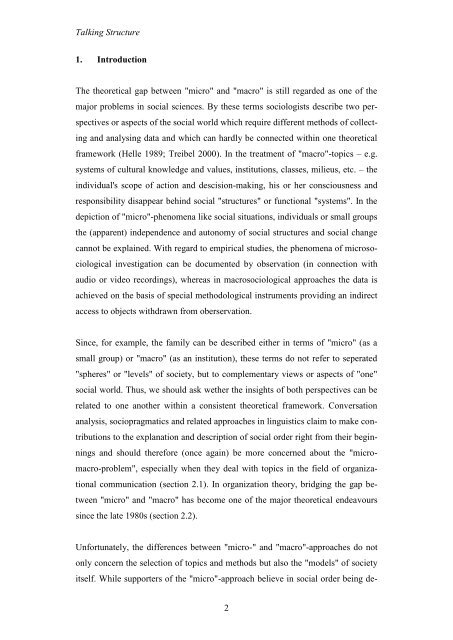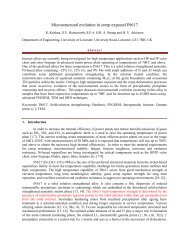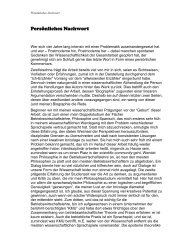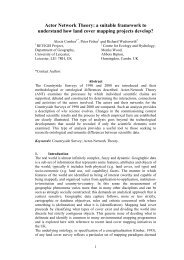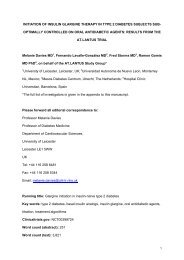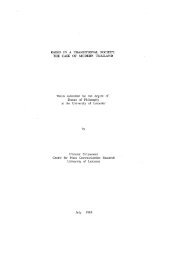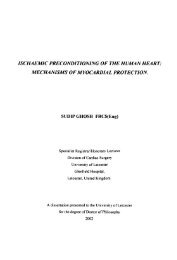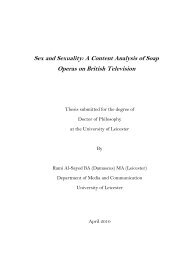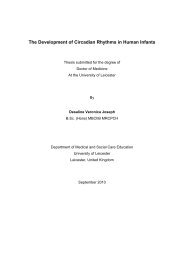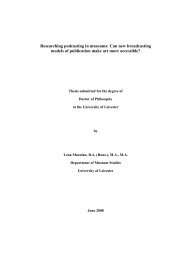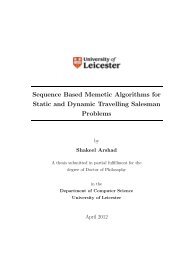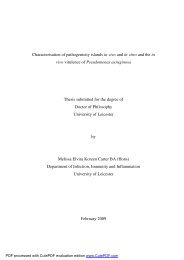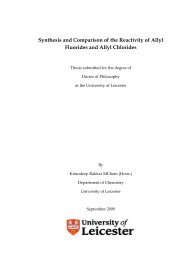In organisation theory, bridging the gap between „micro“ and „macro ...
In organisation theory, bridging the gap between „micro“ and „macro ...
In organisation theory, bridging the gap between „micro“ and „macro ...
Create successful ePaper yourself
Turn your PDF publications into a flip-book with our unique Google optimized e-Paper software.
Talking Structure<br />
1. <strong>In</strong>troduction<br />
The <strong>the</strong>oretical <strong>gap</strong> <strong>between</strong> "micro" <strong>and</strong> "macro" is still regarded as one of <strong>the</strong><br />
major problems in social sciences. By <strong>the</strong>se terms sociologists describe two per-<br />
spectives or aspects of <strong>the</strong> social world which require different methods of collect-<br />
ing <strong>and</strong> analysing data <strong>and</strong> which can hardly be connected within one <strong>the</strong>oretical<br />
framework (Helle 1989; Treibel 2000). <strong>In</strong> <strong>the</strong> treatment of "macro"-topics – e.g.<br />
systems of cultural knowledge <strong>and</strong> values, institutions, classes, milieus, etc. – <strong>the</strong><br />
individual's scope of action <strong>and</strong> descision-making, his or her consciousness <strong>and</strong><br />
responsibility disappear behind social "structures" or functional "systems". <strong>In</strong> <strong>the</strong><br />
depiction of "micro"-phenomena like social situations, individuals or small groups<br />
<strong>the</strong> (apparent) independence <strong>and</strong> autonomy of social structures <strong>and</strong> social change<br />
cannot be explained. With regard to empirical studies, <strong>the</strong> phenomena of microso-<br />
ciological investigation can be documented by observation (in connection with<br />
audio or video recordings), whereas in macrosociological approaches <strong>the</strong> data is<br />
achieved on <strong>the</strong> basis of special methodological instruments providing an indirect<br />
access to objects withdrawn from oberservation.<br />
Since, for example, <strong>the</strong> family can be described ei<strong>the</strong>r in terms of "micro" (as a<br />
small group) or "macro" (as an institution), <strong>the</strong>se terms do not refer to seperated<br />
"spheres" or "levels" of society, but to complementary views or aspects of "one"<br />
social world. Thus, we should ask we<strong>the</strong>r <strong>the</strong> insights of both perspectives can be<br />
related to one ano<strong>the</strong>r within a consistent <strong>the</strong>oretical framework. Conversation<br />
analysis, sociopragmatics <strong>and</strong> related approaches in linguistics claim to make con-<br />
tributions to <strong>the</strong> explanation <strong>and</strong> description of social order right from <strong>the</strong>ir begin-<br />
nings <strong>and</strong> should <strong>the</strong>refore (once again) be more concerned about <strong>the</strong> "micro-<br />
macro-problem", especially when <strong>the</strong>y deal with topics in <strong>the</strong> field of organiza-<br />
tional communication (section 2.1). <strong>In</strong> organization <strong><strong>the</strong>ory</strong>, <strong>bridging</strong> <strong>the</strong> <strong>gap</strong> be-<br />
tween "micro" <strong>and</strong> "macro" has become one of <strong>the</strong> major <strong>the</strong>oretical endeavours<br />
since <strong>the</strong> late 1980s (section 2.2).<br />
Unfortunately, <strong>the</strong> differences <strong>between</strong> "micro-" <strong>and</strong> "macro"-approaches do not<br />
only concern <strong>the</strong> selection of topics <strong>and</strong> methods but also <strong>the</strong> "models" of society<br />
itself. While supporters of <strong>the</strong> "micro"-approach believe in social order being de-<br />
2


